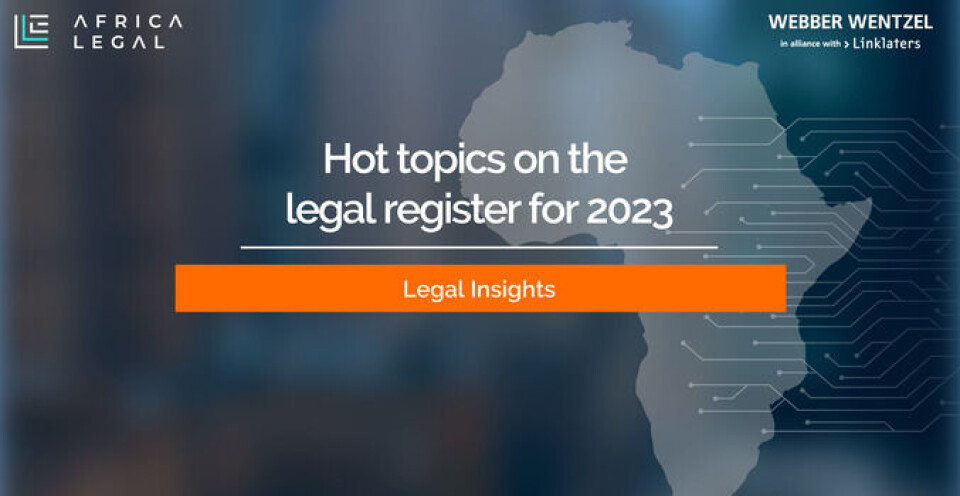Copyright : Re-publication of this article is authorised only in the following circumstances; the writer and Africa Legal are both recognised as the author and the website address www.africa-legal.com and original article link are back linked. Re-publication without both must be preauthorised by contacting editor@africa-legal.com
Hot topics on the legal register for 2023

Each year different subjects of specific concern arise, but the Webber Wentzel teams have identified several key trends that will dominate the legal and regulatory landscape in Africa in the near future.
Webber Wentzel uses its wide network of preferred in-country counsel/relationship firms across Africa to assist clients with navigating the complexity of doing business on the continent, and highlighted some of the issues they have dealt with recently which will be top-of-mind for most big legal firms for some time to come:
- One of the main concerns for businesses operating in Africa is regulatory uncertainty. Investors want to know if there is an underlying pattern or system in policy and regulation that will be applied consistently by different government ministries.
- For businesses trying to move goods across the continent, border controls present a far greater obstacle than the road infrastructure, as they cause lengthy delays.
- Regulatory frameworks are slow to keep pace with technology development. Webber Wentzel is currently advising governments on how to regulate cryptocurrencies and other emerging technologies.
- At the end of 2023, the EU’s Carbon Border Adjustment Mechanism comes into force, and will require importers of goods or commodities into Europe to incur the same carbon pricing as EU manufacturers. This is motivating many South African manufacturers to reduce their carbon footprint by procuring renewable energy.
- Fintech and other technology-focused businesses are continuously emerging in Africa, commercialising their intellectual property, attracting funding from venture capitalists, and doing deals with multinationals. Companies like Amazon and Microsoft are setting up local offices and empowering local people to manage them.
- A fast-growing sector is e-mobility and its associated supply chain, including exploring for and mining lithium.
- Governments and businesses are increasingly aware of the need to improve their ESG standards, partly as a result of the influence of impact funds.
- There is a growing focus on anti-bribery and corruption work, especially in South Africa as it takes steps to move off the FATF grey list.
- The AfCFTA is driving a need for greater standardisation across the continent.
“In the energy sector, there is clearly an increased urgency to add more energy to generate economic growth. South Africa is not the only country experiencing a power crisis,” noted Jason van der Poel. “In this regard, Webber Wentzel and its partner law firms on the continent have advised on various matters, including the Qatar Investment Authority’s investment in Enel Green Power; Actis’ disposal of its renewable energy platform, Lekela; Anglo American’s provision of power to its regional business units in Namibia, Botswana and Zimbabwe; and Sasol’s disposal of part of its stake in Rompco.”
The firm has also helped governments identify constraints in the laws that are inhibiting independent power producers from accessing the power sector, often drawing on experience in South Africa.
“In the trade sector, Webber Wentzel is advising on various aspects of the AfCFTA, including the Rules of Origin annexed to Protocol on Trade. The firm has advised clients on the Treaty of the SA Development Community (SADC), including the SADC Protocol on Trade,” commented Meluleki Nzimande. He explained that the firm also advises clients on the status of the Tripartite Free Trade Agreement and the various economic partnership agreements between the EU and the various southern and eastern African states.
“On tariff support and trade defence in South Africa, domestic producers are preferring to apply for anti-dumping and safeguard measures which have strict investigation time limits as authorities are taking inordinately long to conclude ordinary tariff investigations,” Nzimande noted.
Webber Wentzel also advises on export agreements and ensures compliance with various jurisdictional requirements. “Supply chain optimisation is another busy area, with clients needing advice on what ports and trade routes to use in moving goods across Southern Africa and other parts of the continent,” said Yael Shafrir.
“In the mining sector, there is significant investor interest in battery minerals,” Bruce Dickinson noted. “Webber Wentzel has advised on the acquisition, funding and disposal of lithium projects in Zimbabwe and Namibia, the development of copper/cobalt projects in the DRC, copper projects in South Africa and Botswana, as well as associated offtake arrangements. The firm is currently assisting a multinational group with its proposal to the Botswana government to facilitate the development of renewable power projects to facilitate the greening of various mining projects.”
A continuing theme in the mining sector is resource nationalism. In various mineral-rich jurisdictions, mining companies need advice on their arrangements with host governments.
“ESG is also high on mining companies' agendas,” Nomsa Mbere pointed out, “and the firm is working with various clients on innovative greening projects, pragmatic community solutions and integration, as well as governance issues ranging from instilling high levels of corporate governance through supply chains to ethical sourcing and ESG risk analyses and the identification of mitigation solutions.”
Private equity (PE) will always be a hot topic and Webber Wentzel and its partners recently worked with a PE firm in Botswana, Zambia, and Zimbabwe in its acquisition of a financial company. The firm’s technology, media, and telecommunications (TMT) team is also in demand, and is currently advising a bank in Malawi on its banking systems.
To join Africa Legal's mailing list please click here
